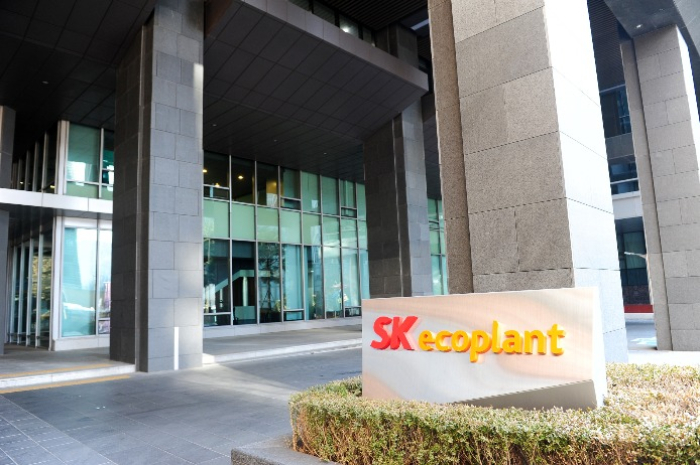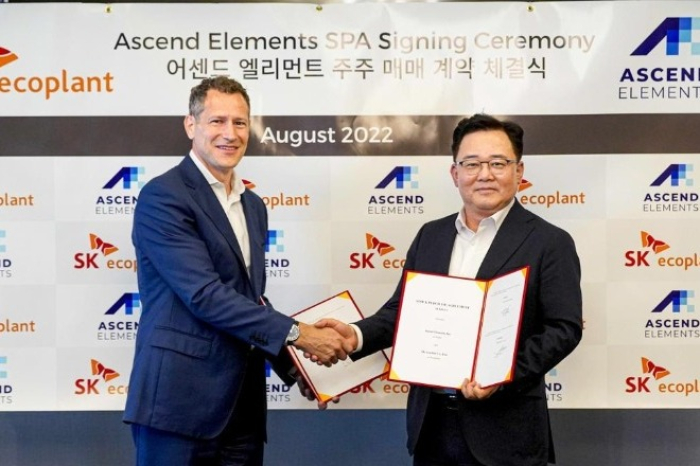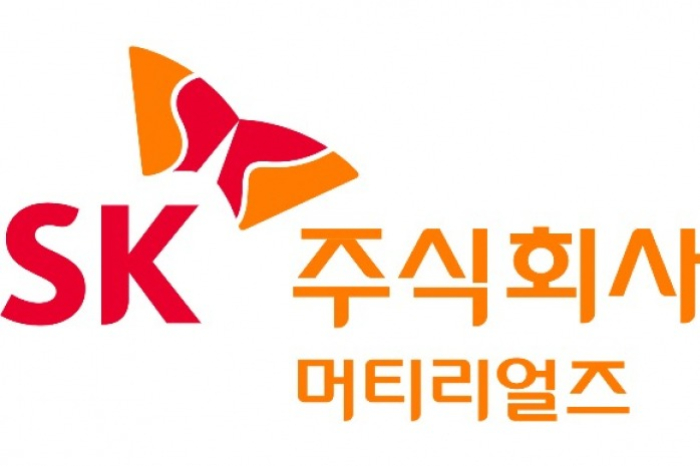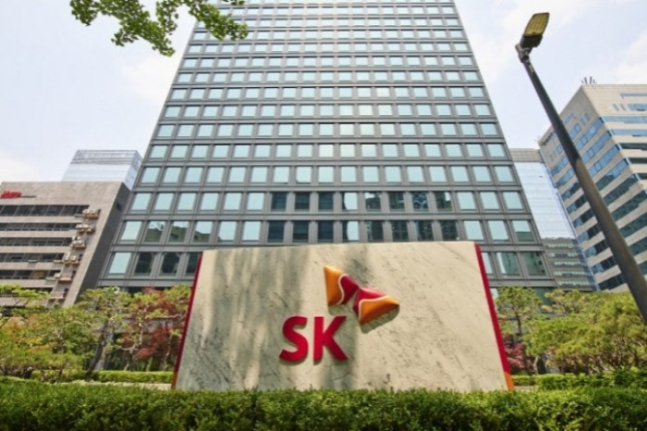SK embarks on business overhaul to focus on mainstays
SK Ecoplant will sell stakes in US lithium-ion battery recycling firm Ascend Elements; SK Materials already sold shares in NET Power
By May 29, 2024 (Gmt+09:00)
When in S. Korea, it’s a ritual: Foreigners make stops at CU, GS25, 7-Eleven


Maybe Happy Ending: A robot love story that rewrote Broadway playbook


NPS yet to schedule external manager selection; PE firms’ fundraising woes deepen


Seoul appeal: Korean art captivates Indonesia’s affluent connoisseurs


K-pop stocks surge as China set to loosen cultural ban after 9 years



South Korea’s second-largest conglomerate SK Group has embarked on a reshuffling process to focus on core units such as semiconductors and batteries amid lingering economic uncertainties.
According to sources in the investment banking industry on Wednesday, SK Ecoplant Co., SK Group’s construction engineering and waste management firm, is in talks with potential buyers, including a US company and a private equity firm, to sell its stakes in Ascend Elements Inc., a US-based lithium-ion battery recycling and engineered materials company.
The Korean company has invested a total of $6.1 million in the US company since 2022 to become the latter’s largest shareholder. It has also been given a board directorship to supervise the US green energy company's management.
Founded in 2015, Ascend Elements is one of the fastest-growing battery recycling companies in the US, and its patented Hydro-to-Cathode technology is hailed as an innovative precursor production method thanks to its direct precursor synthesis process that simplifies recycling and transforms old batteries into sustainable battery materials.
It is building North America’s first electric vehicle battery cathode precursor (pCAM) manufacturing facility in Hopkinsville, Kentucky.
If SK Ecoplant succeeds in divesting of its shares in Ascend Elements, it is expected to enjoy a handsome return worth more than 200 billion won ($146.4 million), considering that the US company’s enterprise value has ballooned to more than 2 trillion won last year from about 600 billion won in 2022 when the Korean company first invested in it.

The stake sale is part of SK Group’s efforts to reorganize its non-core businesses at home and abroad to focus on mainstay businesses such as semiconductors, batteries and petrochemicals.
The group controls over 200 subsidiaries in the semiconductor, battery, materials, energy, construction, telecom, media and bio sectors.
FOCUS ON STRENGTHS
SK’s industrial gas manufacturing unit SK Materials Co. last week also sold 2.5 million shares of NET Power Inc. for about $25 million in a block trade, according to a filing to the US Securities and Exchange Commission.
The Korean company invested $50 million in the US clean energy technology company in a private investment in public equity (PIPE) placement in May of last year.
Following the stake sale, SK Materials' stake in NET Power dropped to 15.5% from 16.7%.
Founded in 2010, Durham, North Carolina-headquartered NET Power has the patented technology that produces electricity by combusting natural gas with pure oxygen, creating water and carbon dioxide – most of which is recirculated back into its power generation system. Excess high-purity CO2 can be sold to industry or sequestered underground.

SK Materials and NET Power have agreed to set up a clean energy power station joint venture through the stake investment.
The Korean company said it has sold the NET Power stake to invest more in carbon capture, utilization and storage (CCUS) technologies.
This underscores SK Group’s shift in green investment strategy to be more selective and focused, industry observers said.
SK Ecoplant will also use some of the proceeds from Ascend Elements’ stake sale in bolstering its wholly owned e-waste recycling subsidiary SK TES, formerly TES Envirocorp Pte., which was acquired in 2021, to take the lead in global waste battery recycling, while using the remaining to improve its financial health.
SK Ecoplant’s debt snowballed to 10.49 trillion won as of the end of 2023 from 3.58 trillion won two years ago.
MORE NON-CORE ASSETS UP FOR SALES TO FOCUS ON BATTERY
The latest change, however, does not mean that SK will cut overall investment. On the contrary, the conglomerate has steadily increased investment in the battery sector.

The group’s battery-making unit SK On Co., also the world’s fifth-largest EV battery producer, on Tuesday invested $26.8 million into Korean robot automation system developer Yuilrobots Co. through its US subsidiary SK Battery America Inc.
The American subsidiary is now the second-largest stakeholder of the robot automation system company with a 14.6% stake.
“Industrial robots are expected to be employed to automate the battery-manufacturing process,” said an SK Group official, adding that the company will continue to invest in promising technologies despite unfavorable business conditions.
More blue-chip assets like Ascend Elements and NET Power are expected to be put up for sale as part of SK’s business restructuring efforts, which will likely gain traction after the group’s annual strategy meeting next month, according to industry observers.
Speculation has been growing that SK will come up with a business reorganization plan during the meeting, which may include a discussion of stake sales of EV material maker SK IE Technology Co. (SKIET), cash-cow lube oil maker SK Enmove Co. and SK Incheon Petrochem Co.
Write to Woo-Sub Kim, Jun-Ho Cha and Hyung-Kyu Kim at duter@hankyung.com
Sookyung Seo edited this article.
-
 BatteriesSK On invests in Yuilrobotics for its US battery plants
BatteriesSK On invests in Yuilrobotics for its US battery plantsMay 28, 2024 (Gmt+09:00)
2 Min read -
 BatteriesSK Ecoplant, TES to enter Japan’s battery recycling market
BatteriesSK Ecoplant, TES to enter Japan’s battery recycling marketMar 12, 2024 (Gmt+09:00)
3 Min read -
 EnergySK Materials makes equity investment in ION for CO2 capture partnership
EnergySK Materials makes equity investment in ION for CO2 capture partnershipMar 02, 2023 (Gmt+09:00)
2 Min read -
 Waste managementSK Ecoplant bets on US battery recycling firm Ascend Elements
Waste managementSK Ecoplant bets on US battery recycling firm Ascend ElementsSep 01, 2022 (Gmt+09:00)
1 Min read -
 Mergers & AcquisitionsSK Ecoplant buys e-waste recycling firm for $1 bn
Mergers & AcquisitionsSK Ecoplant buys e-waste recycling firm for $1 bnFeb 21, 2022 (Gmt+09:00)
2 Min read


